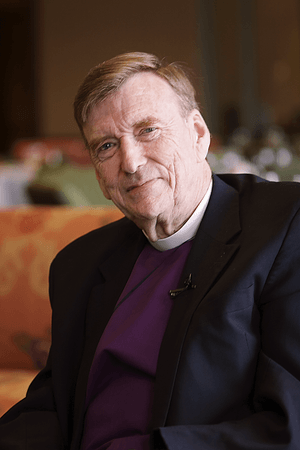John Shelby Spong facts for kids
Quick facts for kids The Right Reverend John Shelby Spong |
|
|---|---|
| Bishop Emeritus of Newark | |

Spong in 2006
|
|
| Church | Episcopal Church |
| Province | Province 2 |
| Diocese | Newark |
| In Office | 1979–2000 |
| Predecessor | George Rath |
| Successor | John P. Croneberger |
| Orders | |
| Ordination | December 1955 |
| Consecration | June 12, 1976 by John Allin |
| Personal details | |
| Born | June 16, 1931 Charlotte, North Carolina, US |
| Died | September 12, 2021 (aged 90) Richmond, Virginia, US |
| Nationality | American |
| Denomination | Anglican |
| Parents | John Shelby Spong, Doolie Boyce Griffith |
| Spouse | Joan Lydia Ketner (m. 1952, d. 1988) Christine Mary Bridger (m. 1990) |
| Children | 5 |
| Previous post | Coadjutor Bishop of Newark (1976–1979) |
| Alma mater | University of North Carolina Virginia Theological Seminary |
John Shelby "Jack" Spong (June 16, 1931 – September 12, 2021) was an American bishop in the Episcopal Church. From 1979 to 2000, he served as the Bishop of Newark, New Jersey. He was a Christian thinker and author. Spong encouraged people to think differently about Christian beliefs. He suggested moving away from very old ideas and traditional teachings.
Early Life and Career
Spong was born in Charlotte, North Carolina. He went to public schools there. He studied at the University of North Carolina at Chapel Hill. He earned a Bachelor of Arts degree in 1952. He then received his Master of Divinity degree in 1955. He also received several honorary degrees later in his life.
Spong served as a church leader, called a rector, in several churches. He was at St. Joseph's Church in Durham, North Carolina, from 1955 to 1957. He also served in Tarboro, North Carolina, and Lynchburg, Virginia. From 1969 to 1976, he was rector of St. Paul's Church in Richmond, Virginia. He also gave talks at important American religious schools. He retired from his bishop role in 2000.
Spong was known for supporting changes in the church. In 1977, he was one of the first American bishops to allow a woman to become a priest. In 1989, he was the first to ordain an openly gay man, Robert Williams. The Episcopal Church later followed his lead. In 1996, a church court said that being gay was not against its rules. In 2015, the church began to recognize same-sex marriages.
Spong said his own journey was from strict, old-fashioned religious views to a more open understanding of Christianity. He was influenced by the Anglican bishop John Robinson. Spong said reading Robinson's books in the 1960s led to a long friendship.
Spong received many awards, including Humanist of the Year in 1999. He appeared on many TV shows. These included The Today Show and 60 Minutes. He also gave lectures around the world.
In 2016, Bishop Spong had a stroke. This happened before a planned speech in Marquette, Michigan.
Spong's Writings and Ideas
Spong's books used ideas from the Bible and other sources. He was influenced by modern ways of studying these texts. A main idea in his writing was that common, very literal readings of Christian scripture are not helpful today. He believed in a more thoughtful way to understand the Bible. This approach could fit with both Christian traditions and modern science.
He thought that the idea of God as a distant, human-like figure was outdated. He believed that Jesus Christ showed God's presence through compassion and selfless love. He said this is what "Jesus is Lord" truly means. He believed that Jesus was fully connected with God. However, he did not believe in the literal truth of some Christian stories. These include the virgin birth and the bodily resurrection of Jesus.
Spong strongly believed that the church should change with society. He called for a new "Reformation." This would mean rethinking many basic Christian teachings.
He believed that religion must always grow and change. He said that old religious ideas should not be thrown out. Instead, people should explore them deeply to find new understandings. He felt that Christianity's mistake was claiming to have captured all truth in old forms.
In 1991, Spong wrote Rescuing the Bible from Fundamentalism. In this book, he suggested that St. Paul might have been gay.
Criticism of His Views
Spong said his writings received both strong support and strong criticism.
Some religious scholars disagreed with Spong's ideas. New Testament scholar Raymond E. Brown called Spong's studies "amateur night." Brown said that no New Testament writer would recognize Spong's view of Jesus.
In 1998, Rowan Williams, who later became the Archbishop of Canterbury, criticized Spong. Williams said Spong's ideas showed "confusion and misinterpretation."
In 2001, Peter Hollingworth, the Archbishop of Brisbane, Australia, banned Spong from speaking in churches in his area. This was because Spong's ideas were seen as "theologically controversial." Later, in 2007, Peter Jensen, the Archbishop of Sydney, also banned Spong from preaching. However, Phillip Aspinall, another Australian church leader, invited Spong to speak in Brisbane.
After Spong's death, some people continued to discuss his impact. Albert Mohler, a seminary president, said Spong's teachings went against many main Christian beliefs.
Death
John Shelby Spong died peacefully in his sleep. He passed away at his home in Richmond, Virginia, on September 12, 2021. He was 90 years old. His death was announced by St. Paul's Episcopal Church in Richmond, where he had once served.
 | Audre Lorde |
 | John Berry Meachum |
 | Ferdinand Lee Barnett |

